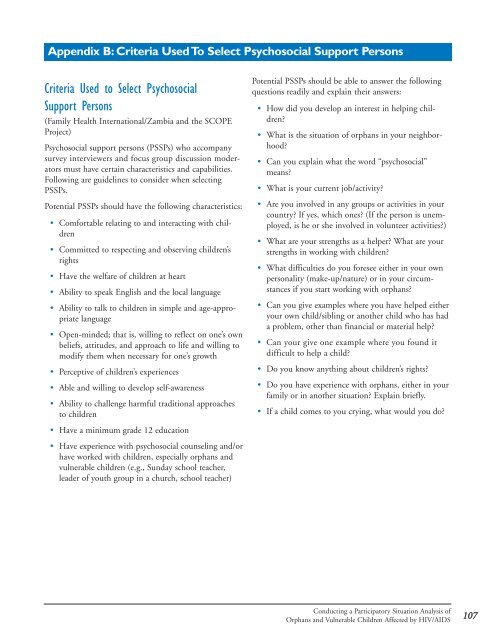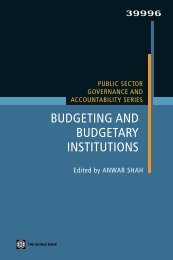Conducting a Participatory Situation Analysis of.pdf - Global HIV ...
Conducting a Participatory Situation Analysis of.pdf - Global HIV ...
Conducting a Participatory Situation Analysis of.pdf - Global HIV ...
You also want an ePaper? Increase the reach of your titles
YUMPU automatically turns print PDFs into web optimized ePapers that Google loves.
Appendix B: Criteria Used To Select Psychosocial Support Persons<br />
Criteria Used to Select Psychosocial<br />
Support Persons<br />
(Family Health International/Zambia and the SCOPE<br />
Project)<br />
Psychosocial support persons (PSSPs) who accompany<br />
survey interviewers and focus group discussion moderators<br />
must have certain characteristics and capabilities.<br />
Following are guidelines to consider when selecting<br />
PSSPs.<br />
Potential PSSPs should have the following characteristics:<br />
• Comfortable relating to and interacting with children<br />
• Committed to respecting and observing children’s<br />
rights<br />
• Have the welfare <strong>of</strong> children at heart<br />
• Ability to speak English and the local language<br />
• Ability to talk to children in simple and age-appropriate<br />
language<br />
• Open-minded; that is, willing to reflect on one’s own<br />
beliefs, attitudes, and approach to life and willing to<br />
modify them when necessary for one’s growth<br />
• Perceptive <strong>of</strong> children’s experiences<br />
• Able and willing to develop self-awareness<br />
• Ability to challenge harmful traditional approaches<br />
to children<br />
• Have a minimum grade 12 education<br />
• Have experience with psychosocial counseling and/or<br />
have worked with children, especially orphans and<br />
vulnerable children (e.g., Sunday school teacher,<br />
leader <strong>of</strong> youth group in a church, school teacher)<br />
Potential PSSPs should be able to answer the following<br />
questions readily and explain their answers:<br />
• How did you develop an interest in helping children?<br />
• What is the situation <strong>of</strong> orphans in your neighborhood?<br />
• Can you explain what the word “psychosocial”<br />
means?<br />
• What is your current job/activity?<br />
• Are you involved in any groups or activities in your<br />
country? If yes, which ones? (If the person is unemployed,<br />
is he or she involved in volunteer activities?)<br />
• What are your strengths as a helper? What are your<br />
strengths in working with children?<br />
• What difficulties do you foresee either in your own<br />
personality (make-up/nature) or in your circumstances<br />
if you start working with orphans?<br />
• Can you give examples where you have helped either<br />
your own child/sibling or another child who has had<br />
a problem, other than financial or material help?<br />
• Can your give one example where you found it<br />
difficult to help a child?<br />
• Do you know anything about children’s rights?<br />
• Do you have experience with orphans, either in your<br />
family or in another situation? Explain briefly.<br />
• If a child comes to you crying, what would you do?<br />
<strong>Conducting</strong> a <strong>Participatory</strong> <strong>Situation</strong> <strong>Analysis</strong> <strong>of</strong><br />
Orphans and Vulnerable Children Affected by <strong>HIV</strong>/AIDS<br />
107















